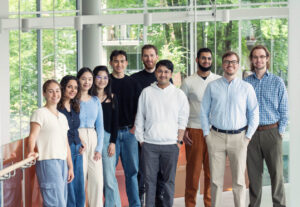
Principal Investigator
Assistant Professor, Department of Cellular and Physiological Sciences (CPS), University of British Columbia
Postdoctoral fellowship, German Center for Neurodegenerative Diseases (DZNE)
PhD, University of British Columbia
BSc in Biology, University of British Columbia
BA in English Literature, University of British Columbia
Research Interests
axon regeneration; Central Nervous System; circuit; Plasticity; Spinal cord; spinal cord injuryDr. Brett Hilton is a Principal Investigator running a multidisciplinary neuroscience laboratory at ICORD. His lab seeks to identify the processes that prevent damaged neurons from regenerating following brain or spinal cord injury. They are also interested in identifying the cells and circuits that are most critical for mediating functional improvements after spinal cord injury.
Dr. Hilton’s big dream is to develop an effective treatment that regenerates the injured spinal cord and restores neurological function following spinal cord injury. “There remain no such therapies available to people with spinal cord injuries today, such that a regenerative therapy for spinal cord injury remains a critical unmet need of the Canadian healthcare system. I’m hopeful that in the next 20 years, our understanding of spinal cord regeneration progresses to such a point that a treatment that is effective at restoring neurological function has emerged,” says Dr. Hilton.
To achieve these goals, the Hilton lab combines bioinformatic, cellular, and molecular approaches together with models of injury and advanced microscopy techniques.
Learn more about Dr. Hilton’s research and the Hilton Lab on their website at hiltonlab.ca/research.html.
Multidisciplinary techniques employed in the lab include:
- Molecular: transcriptomics, genetic loss and gain-of-function experiments, gene cloning
- Cellular: cell culture, live cell and in vivo imaging, electroporation
- Circuit: viral tracing, tissue clearing and 3D imaging analysis, optogenetics, chemogenetics
- Behavioural: Motor and sensory function analyses, assessing efficacy of candidate regenerative treatments

Awards
Some of Dr. Hilton’s recent major awards and accomplishments include:
- Scholar Award, Michael Smith Foundation for Health Research (2023)
- Brain Canada Future Leader in Canadian Brain Research Award, Brain Canada Foundation
- John R. Evans Leaders Fund (JELF), Canada Foundation for Innovation
Current lab members
| Undergraduates | Master’s Students | PhD Students | Postdoctoral Fellows | Research Staff |
|---|---|---|---|---|
| Liam Chippindale |
Eliana Seburn |
Hanna Tagomori |
Dr. Timo Friedman | Samuel Duenwald |
| Abbas Blue | Danya Abazari | Dr. Sarah Wheeler | ||
| Juliana Su | Isa Samad | |||
| Kaylie Yung | ||||
| Mindy Yu |
Trainee Awards
| Year | Trainee | Award |
| 2025-2026 | Danya Abazari |
|
| 2025 | Abbas Blue |
|
| Liam Chippindale |
|
|
| Eliana Seburn | ICORD Translational Research Award ($300, Regional) | |
| Isa Samad |
|
|
| Timothy Friedman |
|
|
| 2024-2025 | Eliana Seburn | CIHR CGS-M ($27,000; National) |
| 2024-2025 | Isa Samad | CIHR CGS-M ($27,000; National) |
| 2024-2027 | Timothy Friedman | CIHR Fellowship ($210,000; National) |
| 2024-2028 | Hanna Tagomori |
|
| 2024 | Danya Abazari | President’s Academic Excellence Initiative Award |
| Isa Samad |
|
|
| Eliana Seburn | CIHR Frederick Banting and Charles Best Canada Graduate Scholarship – Masters |
Recent publications
- Samad, I, Hilton, BJ. 2026. Chromatin accessibility regulates axon regeneration.. Neural Regen Res. doi: 10.4103/NRR.NRR-D-24-01307.
- Friedman, TN et al.. 2025. Plasticity of Mouse Dorsal Root Ganglion Neurons by Innate Immune Activation Is Influenced by Electrophysiological Activity.. J Neurochem. doi: 10.1111/jnc.16292.
- Hilton, BJ, Griffin, JM, Fawcett, JW, Bradke, F. 2024. Neuronal maturation and axon regeneration: unfixing circuitry to enable repair.. Nat Rev Neurosci. doi: 10.1038/s41583-024-00849-3.
- Hilton, BJ et al.. 2022. An active vesicle priming machinery suppresses axon regeneration upon adult CNS injury.. Neuron. doi: 10.1016/j.neuron.2021.10.007.
- Stern, S et al.. 2021. RhoA drives actin compaction to restrict axon regeneration and astrocyte reactivity after CNS injury.. Neuron. doi: 10.1016/j.neuron.2021.08.014.


